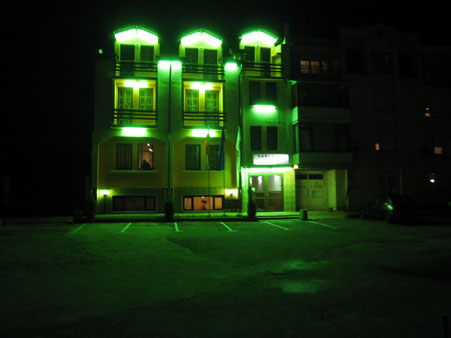After arriving and unpacking last night we went out to eat. On our return the hotel façade was lit in an eerie green which meant that when we open the curtains and balcony door the room is soon abuzz with all manner of flying insects and L and I look as if we are doing a scene for a second-rate zombie movie. Since its hot we decide to change rooms.

In the morning we walk to the town square, passing people hard at work tidying up the town centre — picking up litter, repainting white stripes on the kerb stones and scraping chewing gum off the pavement. |
|
We fall in behind a whole procession of folk dance groups on their way to rehearsal. And then it begins to rain. After it stops, we leave our sheltering café and almost go by a stall selling traditionally-dressed, wooden puppets on strings. The men are smiling and the women solemn. B asks the salesman why. Without missing a beat he says, ‘Well, in the last few years in Bulgaria women have had nothing to laugh about.’
Further on B mentions in passing that the going rate for rose picking this year is about 20 cents a kilo. Since we haven’t been out into the fields yet we don’t know exactly what that means, but it doesn’t seem to be much. Apparently French companies have a major interest in the rose oil produced here.
Over lunch we talk to B’s father, a retired engineer, about the changes in the economic system. He tells us about licensing agreements to produce diesel motors and fork lift trucks. These were made mainly for other Comecon countries which meant that the market collapsed rapidly. He gives us the example of a factory that used to produce 4000 tractors a year is presently making 5 a week. He also says that simple corruption was also involved. Some of the managers deliberately allowed orders and the factories to fall into disuse calculating that they would be able to buy the companies (or what remained of their assets) cheaply. As an exception he mentions the teaspoons that I noticed last year in Burgas — they are still going strong. The production of Kalashnikovs under licence too. There is a large factory here, the Arsenal, on the outskirts of town. He says that it is producing much less now but that in the past it was semi-secret, high-status as a work place with an on-site kindergarten and a small zoo for the children. All of which led to a local joke:
‘What do you think they produce in there?’
‘I don’t know, but every evening a busload of children comes out…’ |